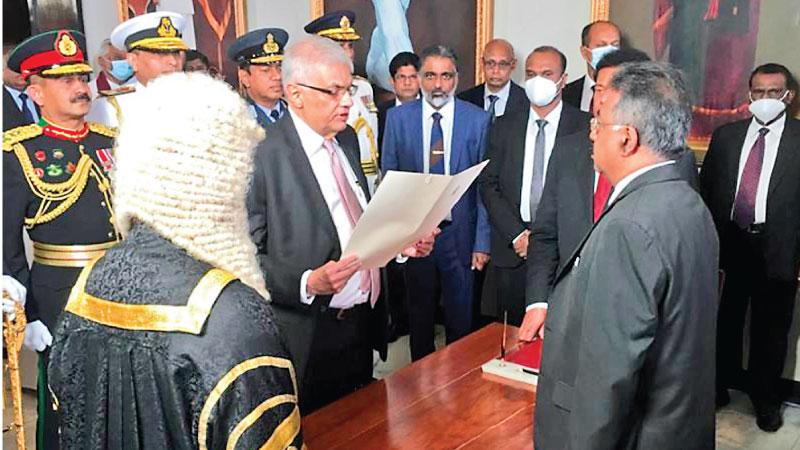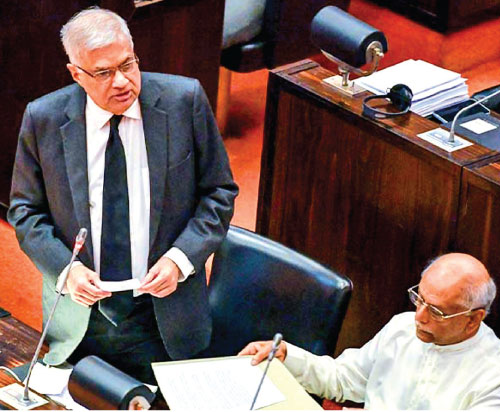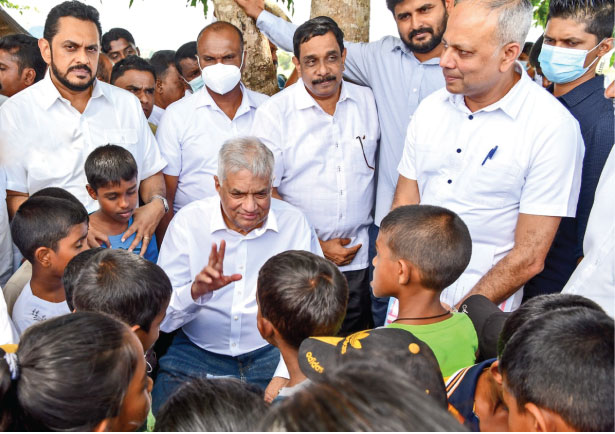
The following are excerpts from a Cabinet Paper presented by President Ranil Wickremesinghe last week on the economic crisis of 2022 and subsequent recovery efforts.
“Sri Lanka was in the grip of the worst economic crisis it has faced in its post-Independence history when I assumed office as Prime Minister and the Minister of Finance in May 2022. I would like to outline several situations that had arisen during that period.
In April 2022, a debt moratorium was declared, aimed at prioritising the repayment of selected foreign debts until the restructuring of domestic debt could be realised.
This strategy was complemented by the assistance of an International Monetary Fund (IMF) loan facility. The rationale behind these measures was rooted in Sri Lanka’s near-depletion of usable foreign exchange reserves, coupled with the challenge of securing foreign currency for essential commodity procurement.
Sri Lanka’s credit rating plummeted to a troubling ‘RD’ (Restricted Default), erasing its capacity to secure international credit facilities.
This downward trajectory in credit rating deterioration commenced in November 2019, following the announcement of extensive tax reductions.
After maintaining the USD exchange rate at Rs.200 for an extended period, its release from constraints led to an uncontrolled depreciation, resulting in the USD rate dropping to Rs.365, though now it has stabilised at a lower level.
The insufficiency of foreign exchange reserves for essential purchases triggered severe shortages in fuel, LP Gas, pharmaceuticals, and fertiliser. This dearth, combined with an 80 percent devaluation of the foreign exchange rate, propelled import costs significantly higher. Consequently, this escalation in expenses precipitated a surge in the prices of goods.
In 2022, the economy contracted by 7.8 percent, primarily attributed to fuel shortages, prolonged power outages, and a deficiency in imported production inputs. The scarcity of fertiliser also resulted in a substantial 95 percent surge in food inflation during the same year.
 The tax exemptions granted in 2019 led to an 8.3 percent decline in State revenue as a proportion of the Gross Domestic Product (GDP), posing significant challenges to the Public Finance sector. Consequently, Sri Lanka was categorised as a country with one of the lowest Revenue Ratios (RT) globally. As of the end of June 2022, outstanding bills accumulated to Rs. 214 billion.
The tax exemptions granted in 2019 led to an 8.3 percent decline in State revenue as a proportion of the Gross Domestic Product (GDP), posing significant challenges to the Public Finance sector. Consequently, Sri Lanka was categorised as a country with one of the lowest Revenue Ratios (RT) globally. As of the end of June 2022, outstanding bills accumulated to Rs. 214 billion.
Due to the inability to secure foreign financial facilities, the Budget was exclusively managed through domestic funding sources. The severe economic difficulties triggered social unrest and political turmoil.
Corrective measures
Against this backdrop, Sri Lanka’s economy and society were teetering on the brink of collapse, drawing parallels with countries like Lebanon. In order to avert any worsening of the situation, the urgent need for the Government and the Central Bank of Sri Lanka (CBSL) to implement emergency policy decisions was underscored, given the dire economic circumstances.
Although these corrective actions had short-term repercussions on citizens, they were indispensable to forestall more detrimental impacts on individuals and businesses, curb hyperinflation, and prevent further deterioration of economic activities.
They played a pivotal role in preventing Sri Lanka from becoming isolated on the global stage and mitigating potential catastrophic consequences arising from economic instability.
Subsequently from July 20, 2022, starting my tenure as President, the new administration took a series of corrective measures.
To establish stability in public finances, tax reforms and expenditure, new management protocols were implemented. These included progressive tax adjustments aimed at distributing a greater tax burden on those with the capacity to bear it.
This initiative led to a reduction of the primary deficit by 3.7 percent of the GDP. By the initial quarters of 2023, the Government achieved a primary surplus that exceeded the structural benchmarks set by the IMF.
To ensure price stability, interest rates were heightened to manage both overall demand within the economy and import demand. By June 2023, Sri Lanka successfully met the IMF’s structural criteria concerning debt extended to the Government.
The fiscal policies implemented resulted in a significant reduction in inflation, which had surged to 70 percent by September 2022, marking the highest level. This rate descended to single digits, reaching 6.3 percent by July 2023. Notably, food inflation, which stood at 90 percent in August 2019, plummeted to a mere 1.4 percent by July 2023. Concurrently, there was a steady decline in interest rates.
In May 2022, the power and energy sector implemented cost-based pricing in response to fuel expenditures. This approach was also extended to electricity tariffs, a crucial move to remove political influence from power and energy pricing. By adopting this pricing strategy, the precarious financial situation faced by the State-run enterprises was rectified.
The restructuring of the Ceylon Petroleum Corporation (CPC) and the Ceylon Electricity Board (CEB) contributed to stabilising their financial statuses, enabling a consistent supply of power.
In the face of limited foreign exchange reserves, temporary measures were implemented to allocate these resources exclusively for essential imports. This led to the imposition of import restrictions and constraints on various payment methods for imports. However, allowances were made for the import of essential manufacturing inputs to ensure the continuity of the export market. Subsequently, import restrictions were partially eased, with a focus on promoting the acquisition of foreign exchange through legitimate banking channels.
By relaxing import restrictions, any shortages of goods were effectively addressed. The strengthening of the Rupee (LKR) by June led to a reduction in import costs for goods, which is anticipated to have positive repercussions for the economy in the upcoming months.
Efforts were initiated to restructure foreign debt, and with assurances extended to creditors, the IMF Executive Committee granted approval for a loan (Extended Fund Facility) facility for Sri Lanka. Ongoing discussions with creditors aim to further this restructuring process. Beginning on July 4, domestic debt restructuring commenced, following Cabinet approval on June 28, 2023, and subsequent Parliamentary approval on July 1, 2023.
These financial developments have contributed to stabilising the financial markets, resulting in a decrease in interest rates. This shift is expected to encourage investments and consumption, thereby normalising the economy. The debt restructuring process is projected to conclude by the fourth quarter of 2023.
The Government has engaged in a dialogue with multi-party financial institutions to secure funds for essential needs such as fertiliser, medications, and social security. Notably, Sri Lanka secured financial support from various sources: US$ 330 million from the IMF, US$ 350 million from the Asian Development Bank (ADB), and US$ 700 million from the World Bank (WB). Additionally, the country attracted US$ 200 billion in short-term foreign investments. As a promising sign, the food inflation rate dropped significantly from 95 percent to 4.1 percent as of June 2023.
Economic stability
Although these measures enabled the Government to establish fundamental economic stability, achieving complete stability and growth will require additional time.
To ensure this outcome, it is imperative to embrace the IMF’s economic reforms. This entails attaining a primary budget surplus and effectively managing expenditures through stringent financial discipline measures, all while executing robust plans to generate substantial revenue.
There is no leeway for deviation from these crucial benchmarks. The Government has pinpointed essential reforms that must be executed in the forthcoming months. Similarly Parliament has also approved amendments to the CBSL Act, Banking Act and the enactment of new Anti-Corruption laws. These laws are important to ensure Sri Lanka does not once again face a crisis similar to that of 2022.
Drawing non-loan foreign exchange is a sustainable, long-term solution. This approach should adequately cover import costs and foreign debt obligations. This reservoir of foreign exchange stems from the export of goods and services, as well as Foreign Direct Investments (FDI), constituting the foundation of these non-loan direct investments. To this end Sri Lanka’s market must expand beyond the 22 million population in the country.
The Government is attempting to reach trade agreements with various partners including India, China and Thailand. Sri Lanka is also expecting to obtain Regional Comprehensive Economic Partnership (RCEP) membership to allow it to enter the East Asian market. This would enable an investor in Sri Lanka to tap into a market comprising more than three billion consumers, presenting significant export opportunities.
Systematically easing Sri Lanka’s import constraints holds significant importance. The Government is committed to progressively eliminating assorted para-tariffs that have been enforced. A trade adjustment framework, as outlined in last year’s Budget speech, becomes crucial to aid organisations impacted by adjustment costs during the process of liberalisation.
Simultaneously, there will be a focus on bolstering the economic product supply sector in conjunction with the growth of demand-related market expansion.
The ongoing economic reforms are geared towards discouraging extravagant consumption patterns, while implementing public finance policies that prioritise long-term investments and savings. The Government is currently constrained in its ability to offer financial assistance for boosting production capacities, given its existing commitments to fund salaries, pensions, Samurdhi, and various social welfare benefits. As a result, the emphasis will be on resolving the hurdles encountered by private enterprises in enhancing their output. The Government intends to address the numerous gaps present in land, labour, and capital markets through proactive measures.
 There is an urgent requirement to allocate suitable land for productive purposes, as all Investment Zones have reached their capacity. Therefore, the identification of State-owned land for various economic activities becomes crucial.
There is an urgent requirement to allocate suitable land for productive purposes, as all Investment Zones have reached their capacity. Therefore, the identification of State-owned land for various economic activities becomes crucial.
Proposed amendments to labour laws aim to implement necessary reforms in the labour market with the goal of positively impacting both labour productivity and participation.
Enacting well-defined bankruptcy laws is also recognised as a crucial necessity. A new Public Finance Management Act is being drafted to ensure more effective management practices within the Government and State-Owned Enterprises (SOEs). Additionally, the Government is taking steps to introduce e-procurement services to enhance transparency.
The establishment of a Sri Lanka Revenue Authority (SLRA) is in progress to enhance and boost Government revenue. Simultaneously, a National Single Window (NSW) system for trade is being developed to streamline and enhance international trade productivity by minimising in-person interventions.
The Government is also committed to modernising the agricultural sector while simultaneously working towards reducing costs within the power and energy sector.
This entails focusing on generation mixes and implementing reforms. The unbundling of the CEB is a crucial step in increasing generation capacity and attracting investments. Renewable energy will be a cornerstone of this program.
Despite the constraints posed by limited public finance resources, it is imperative for the Government to enhance investments in education, health, transportation, and digitisation. While investments in transportation and digitisation can yield immediate benefits, they will also lay the foundation for long-term economic stability.
Allocating resources to education and healthcare sectors contributes to Human Capital development, fostering innovation and economic growth. Similarly, investments in modernising transportation and embracing digital technologies can streamline processes, stimulate economic activity, and create new opportunities.
Given the urgency of addressing Climate Change, it is vital to allocate public assets to mitigate its impact and limit its effects. Collaborating with the private sector is essential in this endeavour, as combined efforts can yield more impactful and practical outcomes.
Amid these efforts, a priority must be to safeguard the interests of the vulnerable, ensuring that the poor and at-risk communities are protected and supported.
The measures implemented over the past year represent the most demanding reforms ever undertaken in the country’s history. But the crisis is not yet over.
It is crucial to remain committed to their sustainable execution over several more years to come and consolidate the gains made so far.
The subsequent phase of recovery and resurgence might encounter greater challenges in terms of public support, as enthusiasm for reforms may diminish with the return to normality. Hence, it is essential to cultivate a shared understanding of the reforms necessary to enhance the country’s economic standing.
The Government has taken into account the need for reforms in areas such as land, labour, and other market segments. It is actively developing requisite legal and institutional frameworks to facilitate these changes. We must adhere to Best Practices in this process.
Reforms
Sri Lanka’s historical record of implementing IMF-proposed reforms has often been unfavourable, primarily due to a tendency to abandon challenging reforms once a certain level of stability is achieved. This cycle of opting for short-term popular decisions has led to significant consequences. As we have already witnessed the adverse effects of such choices, it is clear that there is no room for a second chance this time around.
The people of Sri Lanka have collectively made significant sacrifices to achieve economic stability and restore normality. It is crucial for us to unite and work towards building a rapidly developing, equitable, environmentally conscious, and sustainable economy by embracing the upcoming round of reforms.”
